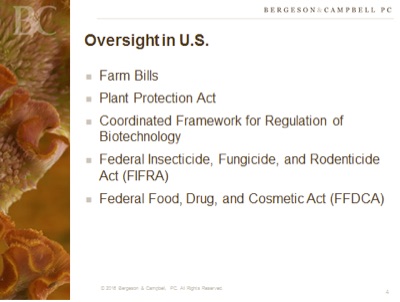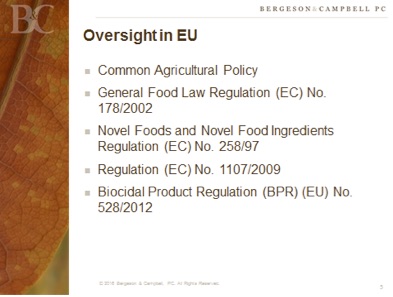Lynn L. Bergeson Presents “Sustainable Agriculture and Food Security in the Mediterranean Region: Modern Agriculture and Technology” at the International Bar Association 4th Mediterranean Conference
On June 6, 2016, Lynn L. Bergeson, President of The Acta Group (Acta®), presented “Sustainable Agriculture and Food Security in the Mediterranean Region: Modern Agriculture and Technology” at the International Bar Association 4th Mediterranean Conference in Rome, Italy. Ms. Bergeson began her presentation with a discussion of the similarities between U.S. and European Union (EU) oversight systems. Both systems address comprehensively potential risks posed by evolving agricultural technologies through a complex web of horizontal and vertical laws. While both systems are up to the task of addressing potential risks, they could be improved with more education for policy makers on evolving technologies such as nanotechnology, synthetic biology, and agricultural biotechnology, as well as through greater private sector involvement.
Ms. Bergeson stated that there is consensus between both systems on the value of the agriculture sector and the belief that there is a critical need to assure food safety, but the role of the Precautionary Principle in the EU can make review and approval more challenging and protracted than in the U.S. The U.S. Environmental Protection Agency (EPA) has been working to propose new policies specifically regulating evolving technologies. In June 2011, EPA issued a proposed policy on nanoscale materials in pesticide products, and has registered a nanosilver-based antimicrobial pesticide product on December 1, 2011, and conditionally registered a second nanosilver product, Nanosilva, in May of 2015. Ms. Bergeson continued, noting EPA also announced plans to “modernize” the Coordinated Framework for the Regulation of Biotechnology in July 2015 for the first time since 1992. To facilitate this modernization, the Biotechnology Working Group (BWG) was formed, and is working to develop a long-term strategy to ensure the federal regulatory system is equipped to assess efficiently the risks, if any, associated with future products of biotechnology while supporting innovation, protecting health and the environment, maintaining public confidence in the regulatory process, increasing transparency and predictability, and reducing unnecessary costs and burdens. Despite these efforts, there is still a need for both the U.S. and EU to improve in soliciting public engagement, quantifying benefits more clearly, and enhancing technological literacy.
For a copy of Lynn L. Bergeson’s full presentation, e-mail hlewis@lawbc.com. Acta professionals have extensive knowledge of the regulatory landscape — with direct involvement in the development of many of the regulatory programs — and are able effectively to counsel clients on commercializing products incorporating biotechnology. Visit our website for more information on our biotechnology services, Regulatory Memoranda regarding biotechnology, and articles.


